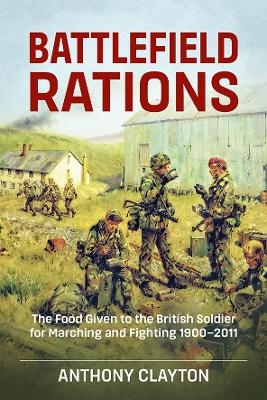
Battlefield Rations
Helion & Company (Verlag)
978-1-909384-18-7 (ISBN)
For many, until 1942, the basis of food was"bully beef" and hard biscuit, supplemented by whatever could be found locally, all adequate but monotonous. Sometimes supply failed, on occasions water also. The extremes of hardship being when regiments were besieged, as in Ladysmith in the Boer War and Kut el-Amara in Iraq in the 1914-18 war. At Kut soldiers had, at best, hedgehogs or birds fried in axle-grease with local vegetation. On the Western Front the Retreat from Mons in August 1914 was almost as severe.
The inter-war years experiences of mountaineers and polar explorers, supplemented by academic diet studies of the unemployed in London and Northern England led to the introduction of the varied composite, or 'compo' rations, marking an enormous improvement in soldiers' food, an improvement commented upon by the bully beef and biscuits-fed 8th Army advancing into Tunisia from Libya on meeting the 1st Army which had landed in Algeria with tins of compo. Soldiers landing in Normandy and fighting on into Germany were generally well fed even during a hard 1944-45 winter. The worst suffering, though, fell on soldiers in the Burma campaign, especially in the Chindit columns. In one unit the only food available at one time was the chaplain's store of Communion wafers. Many men died unnecessarily from the results of poor feeding.
The work has been compiled from documents in the Royal Logistic Corps Museum at Deepcut, from memoirs, letters and interviews, and from the superb collection of regimental histories in the library of the Royal Military Academy Sandhurst.
All royalties from this book will be given to the Army Benevolent Fund.
Anthony Clayton was a lecturer at the Royal Military Academy Sandhurst from 1965 to 1993 and an Associate Lecturer at the University of Surrey from 1994 to 2008. He was educated at the Sorbonne in Paris and the University of St. Andrews. He served in the colonial Government of Kenya until 1963 and in the Territorial Army in the infantry and later in the Intelligence Corps, finishing as a lieutenant-colonel. He has published works on British and French military history, among them "The British Empire as a Superpower 1919-1939" and "The British Officer from 1660 to the Present"; "France, Soldiers and Africa: The Wars of French Decolonisation"; "Paths to Glory: The French Army 1914-1918" and "Three Marshals of France". For his work on the French military he was made a Chevalier in the Odre des Palmes Academiques. He was also awarded the Medal of Honour of the Gesellschaft zur Forderung des Wiedevaufbaus der Frauenkirche Dresden for his work for the Dresden Trust. His other works include chapters in the Oxford History of the British Empire and the Cambridge History of War, 'Warfare in Woods and Forests'. Anthony Clayton is a widower visited frequently by his son, daughter and grandchildren. He lives with a cavalier King Charles spaniel in Farnham, Surrey.
| Erscheint lt. Verlag | 7.5.2024 |
|---|---|
| Reihe/Serie | Helion Studies in Military History |
| Zusatzinfo | c 30 b/w photos, ills |
| Verlagsort | Solihull |
| Sprache | englisch |
| Maße | 156 x 234 mm |
| Themenwelt | Geschichte ► Teilgebiete der Geschichte ► Militärgeschichte |
| Sozialwissenschaften ► Politik / Verwaltung | |
| ISBN-10 | 1-909384-18-6 / 1909384186 |
| ISBN-13 | 978-1-909384-18-7 / 9781909384187 |
| Zustand | Neuware |
| Haben Sie eine Frage zum Produkt? |
aus dem Bereich


